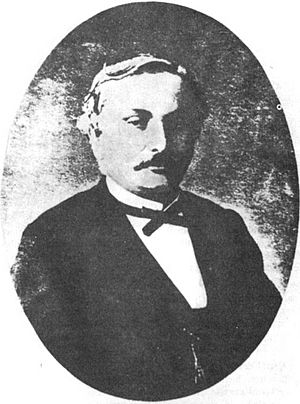Michel Bréal facts for kids
Quick facts for kids
Michel Bréal
|
|
|---|---|

Michel Bréal
|
|
| Born | 26 March 1832 Landau, Kingdom of Bavaria
|
| Died | 25 November 1915 (aged 83) Paris, France
|
|
Main interests
|
Semantics |
|
Influences
|
|
|
Influenced
|
|
Michel Jules Alfred Bréal (born March 26, 1832, died November 25, 1915) was a French expert in languages. He was born in Landau, a town in what was then the Rhenish Palatinate. Bréal is often seen as one of the people who helped create the modern study of semantics. Semantics is the study of the meaning of words and how their meanings change over time.
Contents
Michel Bréal's Life and Work
Michel Bréal studied in several cities like Wissembourg, Metz, and Paris. In 1852, he joined a famous school called the École Normale Supérieure. This school trains teachers and researchers.
In 1857, he traveled to Berlin, Germany. There, he studied Sanskrit, an ancient language from India. His teachers were famous scholars named Franz Bopp and Albrecht Weber.
When he returned to France, Bréal got a job. He worked with old manuscripts from the East at the Bibliothèque Impériale, a large library. In 1864, he became a professor at the Collège de France. He taught comparative grammar, which is the study of how different languages are related.
Bréal became a member of the Académie des Inscriptions et Belles-lettres in 1875. This is a very respected group of scholars in France. From 1879 to 1888, he worked as an "inspecteur général" for higher education. This meant he helped oversee universities and colleges. In 1890, he received a high honor. He was made a commander of the Legion of Honour, a special award from France. He stopped teaching in 1905 and passed away in Paris.
What Did Michel Bréal Write About?
Michel Bréal wrote many books and articles. His works were mostly about myths and languages. Here are some of his important writings:
- L' Etude des origines de la religion Zoroastrienne (1862): This book was about the beginnings of the Zoroastrian religion. He won an award for it.
- Hercule et Cacus (1863): In this work, he disagreed with some ideas about how to understand myths.
- Le Mythe d'œdipe (1864): This book explored the myth of Oedipus.
- Les Tables Eugubines (1875): This was about ancient texts from Italy.
- Mélanges de mythologie et de linguistique (2nd ed., 1882): A collection of his writings on myths and language.
- Leçons de mots (1882, 1886): Lessons about words.
- Dictionnaire étymologique Latin (1885): A dictionary explaining the origins of Latin words.
- Grammaire latine (1890): A Latin grammar book.
- Essai de Sémantique (1897): This was a very important book about the meaning of words. It was later translated into English.
- He also translated a major work by Franz Bopp. This was Bopp's Comparative Grammar (1866–1874). Bréal added his own helpful introductions to it.
Bréal also wrote about education in France. He shared his ideas on teaching old languages and how to improve French spelling. In 1906, he published Pour mieux connaitre Homère, which means "To better know Homer."
Michel Bréal and the Marathon Race
Michel Bréal is famous for something else too: he came up with the idea for the marathon race! He suggested adding this long-distance running event to the very first modern Olympic Games in Athens in 1896.
He made this suggestion to his friend Pierre de Coubertin, who helped start the modern Olympics. The marathon race was created to remember a Greek soldier named Pheidippides. According to old stories, Pheidippides ran a long distance from the Battle of Marathon to either Athens or Sparta. He ran to deliver important news.
See also
 In Spanish: Michel Bréal para niños
In Spanish: Michel Bréal para niños
 | Sharif Bey |
 | Hale Woodruff |
 | Richmond Barthé |
 | Purvis Young |

